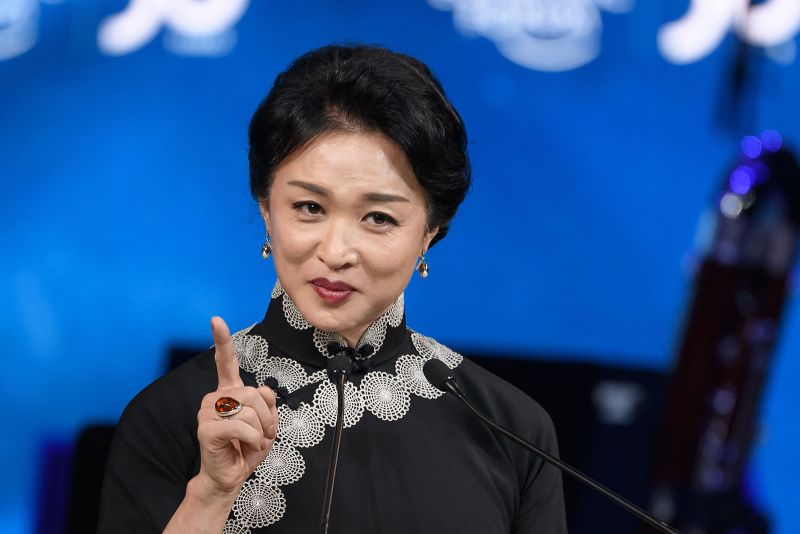Famed transgender dancer has shows canceled in China. Some fear a wider crackdown

Transgender dancer Jin Xing’s ascent to the upper echelons of Chinese show business is extraordinary in a nation where it has become increasingly difficult for LGBTQ+ people to live openly.
The 57-year-old has been a transgender icon in China for years, admired by some of the country’s most marginalized as a rare example of both success and acceptance, even within officialdom.
But a recent series of sudden and unexplained cancelations by local authorities of appearances by her dance troupe has sparked fears Chinese leader Xi Jinping’s authoritarian drive is ensnaring the country’s most prominent openly transgender personality.
Transgender people in China often face social stigma and institutional discrimination, facing issues in looking for work or simply walking down the street without being stared at.
Jin, however, has managed to carve out a decades-long career that defies the norm. She sells out concerts, hosts TV talk shows and boasts 13.6 million followers on her Weibo social media account. More remarkably, she has managed over the years to secure the endorsement of Communist Party officials.
Chinese state media have called her one of “10 legendary figures of Chinese modern dance” and frequently publish glowing profiles.
For other transgender people, she embodies the hope that one day China may become progressive enough to accept them, just as it embraces her.
“I find her very admirable,” he said, speaking under an alias for fear of retribution from the Chinese authorities.
But signs suggest official acceptance of Jin could now be waning.
Chinese authorities have ramped up ideological control over what they consider the undue influence of Western values, including a crackdown on the LGBTQ+ community.
Late last year, authorities in the southern metropolis of Guangzhou canceled her Jin Xing Dance Theater’s show, citing insufficient documents. Subsequently, venues in other parts of the country also dropped her shows, without explanation.
Some from the transgender community are now worried that Chinese authorities are trying to send a message.
Sam Winter, an associate professor who specializes in Asian transgender issues at Curtin University in Australia, said Jin managed to rally support from the authorities because of her years of achievement – which was hard for officials to dismiss, and began at a time when China seemed to be liberalizing.
“But things seem to have changed. Maybe the earlier shift towards a more liberal atmosphere was the problem,” he said.
Brush with authorities
China decriminalized homosexuality in 1997, before removing it from its official list of mental disorders in 2001.
Until a few years ago, the LGBTQ+ community was still allowed to hold an annual Pride parade in Shanghai and share snippets of their lives on chat groups run by university students on social media WeChat.
But the movement has faced a mounting crackdown under Xi, who has adopted a more authoritarian, socially conservative and patriarchal vision for the country.
Support groups have been forced to disband, with activists harassed by police, Pride parades canceled and films and TV shows featuring same-sex themes banned.
Jin’s brush with Chinese authorities began in late October when the Municipal Bureau of Culture, Radio, Television and Tourism in Guangzhou canceled her show at the city’s opera house slated for December.
The show was an adaptation of “Sunrise,” a classic play by renowned Chinese playwright Cao Yu, which Jin’s troupe had been staging nationwide for the past four years, she wrote in a now-deleted Weibo post criticizing the cancellation, state-affiliated online news portal The Paper reported.
She went on to demand the official in charge give detailed reasons for the cancellation, warning in the post: “Please don’t abuse your public power!”
Direct challenges to Chinese authorities are rare and risky. After her post, Jin’s subsequent shows in the cities of Foshan, Suzhou and the commercial hub of Shanghai – where her troupe is based – were also called off by the venues without explanation.
In a recent interview with France 24, the dancer said she was puzzled by the authorities’ decision given how she had been allowed to perform “for 40 years in China.”
Some Weibo users have speculated that Jin may have crossed a red line by holding a rainbow flag that read “Love is Love,” during an earlier show.
Chinese authorities view the rainbow flag – a global symbol of the LGBTQ+ community – with suspicion.
Jin acknowledged the political sensitivity involved during the France 24 interview but said she only waved the flag to comfort the fan who passed it to her.
“This thing happened in January (2024). After that I performed all over the country and had no issues at all,” she added. “Even today, I am still questioning why.”
Online discussion on China’s heavily censored internet has been split over Jin’s cancelations, from more nationalist rhetoric describing LGBTQ+ issues as some sort of foreign conspiracy, to others expressing sympathy and admiration for Jin.
From military born to ‘China’s Oprah’
Part of what made Jin’s rise extraordinary was that she was born into a military family. Her father was an army officer and her mother is a Japanese interpreter.
After realizing her passion for dance, her parents sent her to one of the best dance schools run by the People’s Liberation Army at the time, according to an interview she gave to state-affiliated online news platform Shine.
That meant that Jin not only received rigorous ballet training but also did tough military drills from the age of nine.
During her teens, she won dance awards as she rose through the military ranks. She was considered a “national property,” according to Shine.
In 1987, she moved to New York to study modern dance on a scholarship and subsequently worked as a choreographer and dancer in Rome and Brussels, before eventually returning to China, where she underwent gender-affirming surgery at the age of 26.
The procedure left her left leg paralyzed for months, she told China Daily.
But Jin bounced back and founded Jin Xing Dance Theatre in 1999.
Not only did she push boundaries as a transgender woman, she also popularized modern dance in China.
As her fame rose over the years, she was invited to host talk shows and soon became known for her straight-talking humor with guests.
The Hollywood Reporter dubbed her the “Oprah of China” and Jin was able to walk the fine line of providing frank discussion without upsetting central authorities.
“I am myself and represent only myself. I will always be Jin Xing and it has nothing to do with gender,” she wrote in a recent post on Weibo.
Struggle for transgender people in China
While her life has been celebrated as a success by China’s transgender community, it’s a far cry from many people’s lived experience.
Cyan said he felt like he would never be accepted and had to hide his identity.
“In mainland China you feel like a street rat. You can never tell anyone you’re transgender wherever you go,” he recalled.
He moved to Canada two years after undergoing a gender-affirming mastectomy – also known as top surgery.
“Both my parents and I agreed that my life as a trans person in China was going to be quite difficult,” he said, adding many of his transgender friends also struggled to find employment.
Gender-affirming surgery is expensive and hard to find in China, Cyan said, and patients face significant hurdles.
Even if money is not an issue, hospitals offering such services are limited and pre-requisites are harsh. For example, the person must have parental consent, regardless of age, and have no criminal record. For many, it is already a non-starter given their parents will never approve.
At the same time, undergoing a full gender affirmation procedure, including the reconstruction of the genitalia, is the only way a person can change their gender on identity documents in China.
“During the day, they’re men. At night, they become women after work, without telling their families,” she said.
“I know some of my friends wouldn’t dare go out during the day and only go to bars in the evening. But even at bars, some get ignored,” said Yao.
What happened to Jin, the dancer, only makes people like Yao more pessimistic about what is to come.
“I knew things are going to happen this way, that the environment (for LGBTQ+ people) will get worse and worse from now on,” she said.




